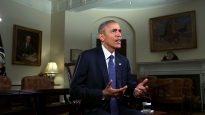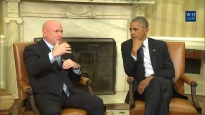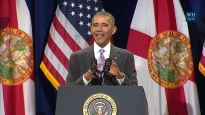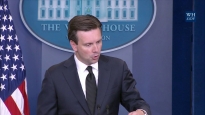President Obama Makes Statement on Economy and Oil Spill
April 30, 2010 | 10:14 | Public Domain
The President speaks about the Federal response to the oil spill in the Gulf of Mexico and says that the economy is on right track after news that the economy grew at 3.2 percent in the first quarter of the year, the third straight quarter of growth.
Statement by the President on the Economy and the Oil Spill in the Gulf of Mexico
11:26 A.M. EDT
THE PRESIDENT: Good morning, everybody. Before I make a statement on the economy, I just want to offer an update on the ongoing federal response to the worsening oil spill in the Gulf of Mexico.
I have dispatched the Secretaries of Interior and Homeland Security, as well as the Administrator of the EPA, my Assistant for Energy and Climate Change Policy, and the NOAA Administrator to the Gulf Coast to ensure that we continue to do everything necessary to respond to this event. And I expect their reports from the ground today.
As I said yesterday, BP is ultimately responsible under the law for paying the costs of response and cleanup operations, but we are fully prepared to meet our responsibilities to any and all affected communities. And that’s why we’ve been working closely with state and local authorities since the day of the explosion.
There are now five staging areas to protect sensitive shorelines; approximately 1,900 federal response personnel are in the area; and more than 300 response vessels and aircraft on the scene 24/7. We've also laid approximately 217,000 feet of protective boom, and there are more on the way.
I've order Secretary Salazar to conduct a thorough review of this incident and report back to me in 30 days on what, if any, additional precautions and technologies should be required to prevent accidents like this from happening again. And we're going to make sure that any leases going forward have those safeguards. We've also dispatched teams to the Gulf to inspect all deepwater rigs and platforms to address safety concerns.
So, let me be clear. I continue to believe that domestic oil production is an important part of our overall strategy for energy security, but I've always said it must be done responsibly, for the safety of our workers and our environment. The local economies and livelihoods of the people of the Gulf Coast as well as the ecology of the region are at stake. And we're going to continue to update the American people on the situation in the Gulf going forward.
Now, I'd like to say a few words about the economy. Every
three months, the federal government measures the total output of goods and services our businesses, our workers and our government produce. It determines whether our economy is shrinking or growing -– the single broadest measure of America’s economic health. At the height of our economic crisis, that measure all too often was delivering grim news. But today is a different story.
In the first quarter of last year, our economy shrank at a rate of 6.4 percent. Today, we learned that in the first quarter of this year, our economy grew at a rate of 3.2 percent.
What this number means is that our economy as a whole is in a much better place than it was one year ago. The economy that shrank for four quarters in a row has now grown for three quarters in a row. And that growth has been a condition for job growth -– the economy that was losing jobs a year ago is creating jobs today.
After the single biggest economic crisis in our lifetimes, we’re heading in the right direction. We’re moving forward. Our economy is stronger; that economic heartbeat is growing stronger.
But I measure progress by a different pulse -– the progress the American people feel in their own lives day in, day out. And this week, I spent a few days visiting with folks in small towns in the Midwest -– places where the damage done by the worst recession in our lifetimes is profound. They’re still trying to recover from a shockwave of lost homes, lost businesses, and more than eight million lost jobs. It’s a tragedy that has families and communities across America too often feeling like they’re on life support.
So while today’s GDP report is an important milepost on our road to recovery, it doesn’t mean much to an American who has lost his or her job and can’t find another. For millions of Americans -– our friends, neighbors, and fellow citizens ready and willing to get back to work -– “you’re hired” is the only economic news they’re waiting to hear. And they are why the work of moving this economy forward remains our focus every single day.
Now, government can’t replace every job that has been lost. That’s not government’s role. It is America’s business all across the country -- the private sector, businesses -- that have always been and will always be the engines of our job creation. Our task, then, is to create the conditions necessary for those businesses to open their doors, expand their operations, and ultimately hire more workers.
That’s precisely what we’ve tried to do by cutting taxes for small businesses; by backing thousands of loans supporting billions of dollars in lending; and by making targeted investments in the areas of our economy where the potential for job growth is greatest -– areas like clean energy.
As an example, this week, I visited workers at a plant in Fort Madison, Iowa. Some of you guys went along. And just a few short years ago, that plant was shuttered and it was dark. Today, it is alive and humming with more than 600 employees at work manufacturing some of the most advanced blades for wind turbines in the world. That facility capitalized on its growth by taking advantage of an Advanced Energy Manufacturing Tax Credit in the recovery that we passed last year, which allowed it to add equipment, boost output, and hire new workers at that plant.
In fact, this program was so successful that it was oversubscribed by a ratio of three to one. That’s why I’ve called for an additional $5 billion in investment into these projects to accelerate the creation of clean-energy jobs in America’s factories. Because every time a new factory or plant opens or expands in America, it becomes important to more people than the workers it employs; it becomes an economic lifeline to a community, capable of supporting dozens, or hundreds, or even thousands of jobs indirectly.
So the CEOs and the workers that we have here today could tell you the same thing. Malcolm Unsworth is the CEO of Itron -- where did he go? There he is, right here. This is a company that produces smart meters to help businesses and consumers analyze real-time data about how they use energy. And these meters help reduce carbon emissions, improve energy efficiency, and save consumers money -– and they’re critical components of the smart electric grid of tomorrow.
The $3.4 billion investment that the Recovery Act made towards that smart grid helped increase demand for Itron’s products. And in January, Itron competed for and won its own Advanced Energy Manufacturing Tax Credit. And it’s using that tax credit to meet that new demand, adding production lines at its plants in Waseca, Minnesota, where it has hired 40 new workers; in Oconee, South Carolina, where it’s hired 120 new workers.
Carla Reysack and James Morris are here, and these are two of the workers who have just been hired. James, a native of Oconee County, recently found himself laid off from a local plant after punching in for 28 years. Today, he and his wife Angela both work at Itron, helping to forge a clean-energy future for their three daughters.
David Vieau -- right over here -- is President and CEO of A123 Systems, a company that produces advanced batteries for energy storage and next-generation vehicles. Last August, following a nationwide competition among America’s clean-energy technology leaders, Vice President Biden traveled to Michigan to announce that A123 was one of the 48 companies to win a Recovery Act grant for advanced battery technology.
That grant helped A123 hire 44 new workers. And that grant is supporting the construction of three new plants in the state of Michigan, which A123 expects will allow it to hire more than 120 workers by the end of this year, more than 1,000 by the end of next year, and more than 3,000 by the end of 2012. Two of those workers, James Fenton and Nino Biundo, are here today. They lost their previous jobs in the recession. And then 123 -- A123 hired them both to help manufacture the batteries of tomorrow.
A123 has already begun construction on one facility in the city of Livonia, which is scheduled to go online in July, and they’ve begun designing a facility in the city of Romulus. And they’ve announced plans to build their first high-volume factory in Brownstown. So truth be told, A123 was looking to build that factory in Asia. But because it received that grant, it chose the state of Michigan for its largest and most innovative plant yet. And that plant will be one of 30 new plants to go fully operational over the next six years manufacturing electric vehicle batteries and components right here in the United States of America.
So this is what’s possible in a clean-energy economy -- these folks right here, doing extraordinary work. This is what happens when we place our bets on American workers and American businesses. And we’re going to continue working to help them manufacture more success stories like these across all sectors of our economy.
So we've still got a long way to go on our road to recovery. There are going to be more ups and downs along the way. But today’s news is another sign that we’re on the right track. And we’re going to keep doing everything we can to help our businesses take the baton and power our recovery today -– and lead us to more hopeful and more prosperous set of days in the future.
Thank you very much, everybody.
END
11:36 A.M. EDT
|
October 22, 2016
|
October 21, 2016
|
October 21, 2016
|
October 21, 2016
|
|
October 21, 2016
|
October 20, 2016
|
October 19, 2016
|
October 19, 2016
|
- &lsaquo previous
- …
- 12
- 13
- 14
- 15
- 16
- 17
- 18
- 19
- 20
- …
- next &rsaquo







